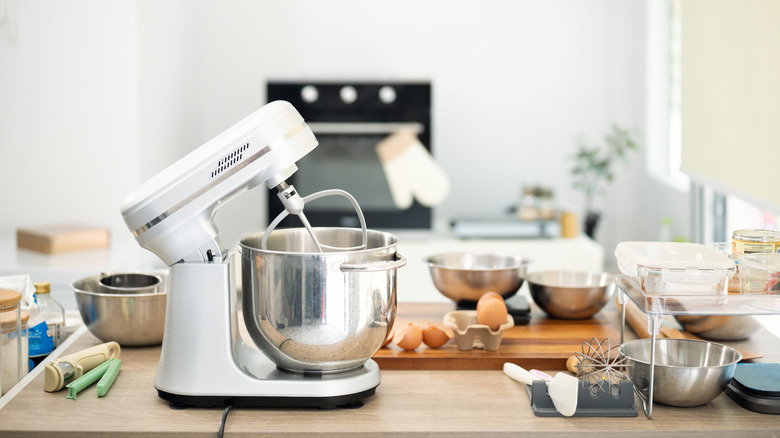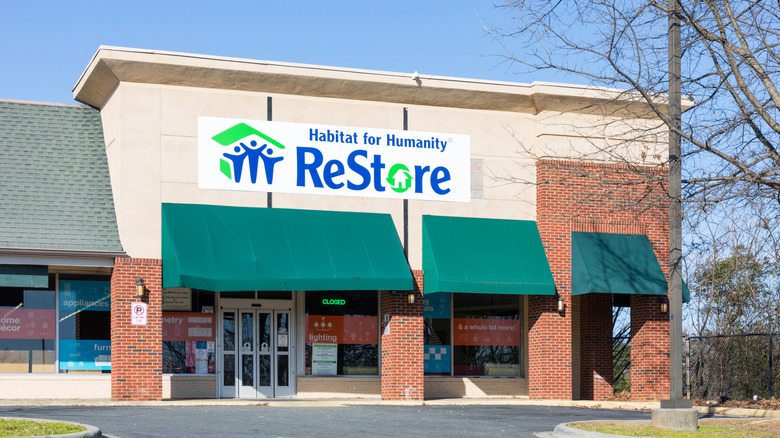The Best Way To Save Money On Kitchen Appliances Without Waiting For Holiday Sales
If your TikTok feed is full of recession recipes, we feel you. Tariffs are impacting food prices, product selection, and even kitchen appliances. Many people in the United States wait for holiday sales before shelling out for big kitchen purchases, but economic uncertainty means that you might end up paying more if you wait. Whether you're trying to save a buck, need a new appliance stat, or are trying to be more eco-conscious, turn to secondhand.
Pre-owned appliances are a great way to save money, and they aren't subject to tariffs. No, I'm not talking about the beat-up, barely functional coffee makers you see in thrift stores. You can snag barely used ranges, refrigerators, and microwaves if you're willing to buy secondhand. You just have to do a little hunting.
It's especially easy to find niche appliances that people once thought they wanted. Looking for a sous vide machine? There's someone out there who got one for Christmas, stored it away, and forgot about it until a closet clean-out years later. The same goes for bread machines, waffle irons, and yogurt makers. Just don't follow the original owner's mistakes. Think long and hard about whether you'll actually use the appliance before you buy. But hey, even if you don't end up using it, it'll be a smaller loss for your bank account — and the planet.
Where to buy pre-owned appliances
If you're looking for large pre-owned appliances, Habitat for Humanity ReStores specialize in building supplies, furniture, and appliances, so it's a great place to start. Check local used appliance stores and repair shops, too. They often have low prices, and some even provide warranties. You can also shop at thrift stores.
Used appliance stores don't always stock smaller gadgets, but great deals on small appliances are everywhere. Facebook Marketplace and Nextdoor are appliance hotspots, but be wary of scams and sketchy situations. The internet's original resale site, eBay, is a safer bet. You'll get buyer protection and a wider range of options. Plus, it's easy to search for specific products and brands. Some brands, like KitchenAid, even have official eBay stores to sell refurbished products. Don't forget to check seller reviews, especially if you're not buying from official accounts. Read descriptions carefully and double-check shipping prices, too. Costs for shipping heavy appliances, like microwaves and stand mixers, can be steep.
Better yet? Mooch off your friends and family. Borrowing your friend's bread machine can help you figure out if it's something you'll actually use before you commit. Your friends and family might be willing to sell you their unwanted appliances for an extra-steep discount, too. If you get lucky, they might even offer old appliances for free. Just make sure to return the favor when you can.
What appliances should you avoid buying pre-owned?
Buying pre-owned appliances is a fantastic, eco-friendly way to stock your kitchen on a budget, but are there appliances you should always buy new? It depends. Some appliances just aren't as well suited for resale. Smart appliances, like Wi-Fi-enabled dishwashers and microwaves, top the list. The gadgets are controversial to begin with, and buying secondhand just exacerbates their preexisting issues. Smart appliances don't typically last as long, and they're likely operating off older technology by the time they hit the resale market. Besides, do you really need AI to cook your steak, or is it just marketing hype?
Smart appliances already pose a security threat, and pre-owned smart appliances are an easy way for hackers to sneak onto your home network. Stick to buying refurbished versions from the manufacturer, and be careful when you're selling them, too. Delete any Wi-Fi networks or identifying information before you pass your smart appliances off to a stranger.
There are some old-fashioned, low-tech appliances that should give you pause, too. For example, the heating elements on electric kettles take a lot of wear and tear, so the devices tend to have a short lifespan. Rubber tubes and seals — like the kind found in coffee machines — can degrade over time or harbor bacteria and residue. The same goes for anything with lots of nooks and crannies.


